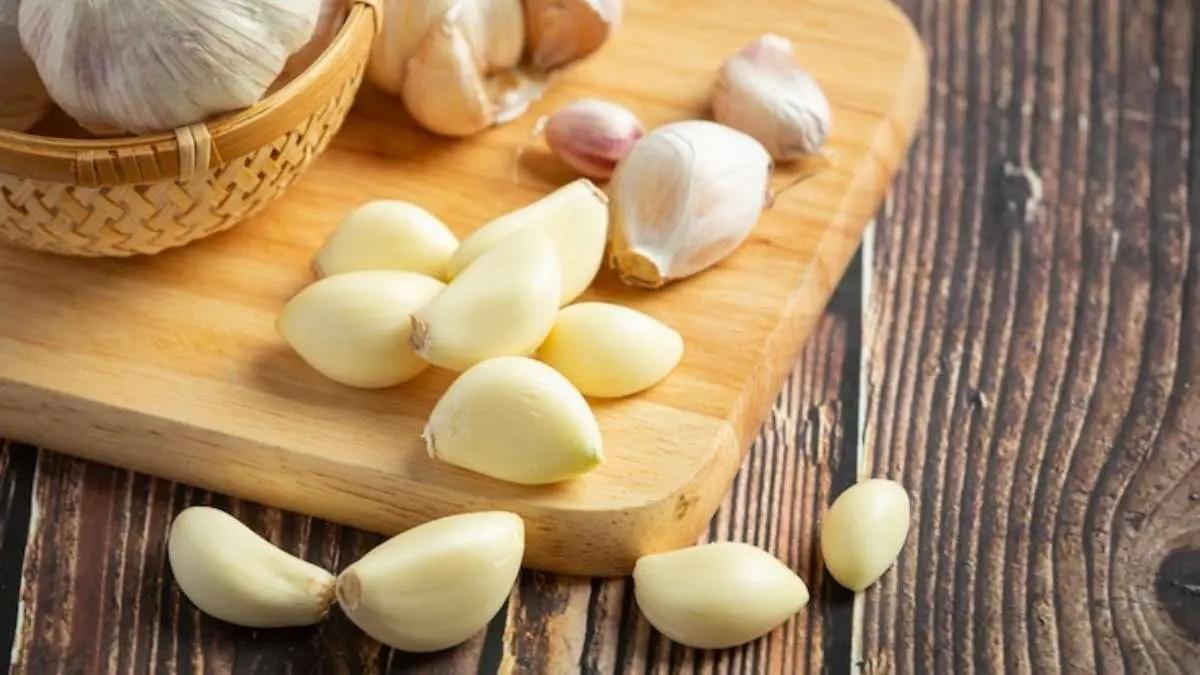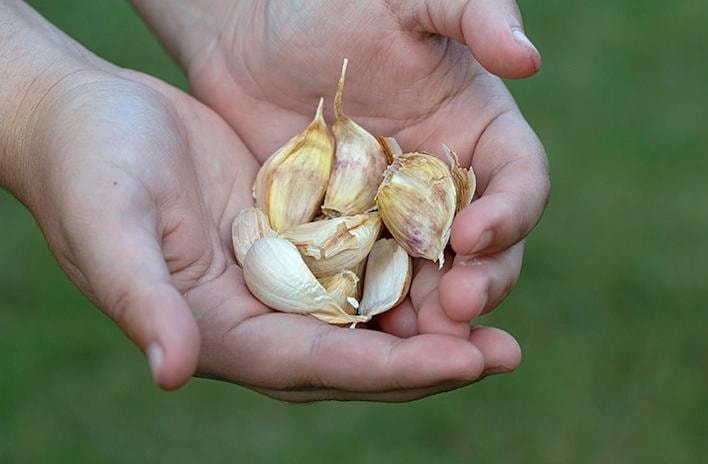How many cloves of garlic should you eat per day for best health benefits?
Eating raw, uncooked garlic is one of the best ways to get the benefits of garlic, but how much and how to eat it properly?
Eating raw garlic has health benefits such as fighting infections and strengthening the cardiovascular system. Garlic and garlic extracts prevent diseases caused by bacteria, parasites and viruses, regulate blood sugar, lower blood pressure and reduce cholesterol…
7 Health Benefits of Raw Garlic
The health benefits of garlic have been attributed to a compound found in garlic called allicin. According to a study in the peer-reviewed journal Molecules, allicin has many health-promoting properties, including cholesterol- and blood-pressure-lowering effects that benefit the cardiovascular system. As such, garlic may be good for blood pressure and support heart health.
Chewing garlic is thought to release more allicin and provide more potential health benefits. However, chewing raw garlic can be very unpleasant due to its pungent smell and taste, so it can be used in cooking.

Good for cognitive health
One benefit of raw garlic is that it contains essential vitamins and minerals, including vitamin B6, manganese, selenium, vitamin C, iron, potassium, and copper. This powerful combination is especially good for cognitive function: Vitamin B6 and magnesium have both been linked to improved mood and brain health.
Supports a healthy immune system
Garlic is an excellent source of vitamin C, which helps boost the immune system. According to the United States Department of Agriculture, about three cloves of garlic contain about three milligrams of vitamin C. To boost your immune system, add some raw garlic to your meals.
Garlic has anti-inflammatory properties
Garlic contains allyl sulfides, an anti-inflammatory, anti-cancer compound that may help slow the growth of cancer cells. Furthermore, its anti-inflammatory properties help protect the body from harmful free radicals and oxidative stress.
May be good for the liver
If you are wondering, "Is garlic good for the liver?" While there is little scientific evidence to support the claim that garlic can "detox" the body, the liver is constantly detoxifying the body by breaking down various substances and sending useful nutrients where they are needed and waste to the kidneys.
Studies have shown that garlic can protect the liver from certain toxins. In turn, a healthy liver helps the body eliminate toxins more effectively, which is important for overall health. In that sense, garlic supports liver function, aiding in “detoxification.”
Good for heart health
Regular garlic consumption is directly linked to heart health benefits. Garlic has long been known to lower cholesterol and stabilize blood pressure. Additionally, its anti-inflammatory effects are also beneficial in reducing the risk of heart disease.
May help protect against osteoporosis
There is some evidence that garlic consumption may help protect against the disease. Garlic may increase estrogen levels in women entering menopause, when bones are at greatest risk of osteoporosis. Some studies have also shown that it slows the effects of osteoarthritis. Although preliminary studies are promising, more research is needed to confirm this link.
Good for skin health
Eating garlic can benefit your skin thanks to its antibacterial and antifungal properties that help treat acne and its general anti-inflammatory benefits that improve overall circulation, including delivering nutrients to the skin more effectively. Garlic is an antibiotic with immune-boosting properties thanks to its antibacterial, antiviral, antifungal, and antiseptic properties, all thanks to the compound allicin found in garlic. Allicin in garlic is also anti-inflammatory and rich in antioxidants, which is great for the skin.

How to eat garlic every day is safe?
Some studies suggest that the optimal amount of raw garlic to consume per day is about 2 to 4 cloves to get the most raw garlic benefits without unwanted side effects like body odor or heartburn.
According to Associate Professor, Dr. Pham Thi Bich Dao, Hanoi Medical University Hospital: To make it easier to eat, crush garlic and mix it with a spoonful of honey or olive oil or supplement garlic daily by drinking liquid garlic extract to help strengthen the immune system, reduce the risk of disease and speed up recovery, and increase resistance when used daily. However, eating too much garlic can cause bad breath and low blood pressure, so you should eat 2-4 cloves of garlic per day.
Additionally, if consuming raw garlic upsets your stomach, research also shows that eating garlic in other forms including garlic allicin, garlic extract, garlic cloves, garlic capsules and supplements may also provide some of the same benefits.
If you are considering adding garlic supplements to your routine, be sure to consult your doctor, especially if you are taking blood-thinning medications. This is because garlic supplements can increase the effects of blood-thinning medications, making it harder for your blood to clot. Additionally, eating too much garlic at once can cause negative side effects such as headaches, fatigue, loss of appetite, muscle pain, dizziness, or in rare cases, allergic reactions.
Garlic has also been known to cause some pretty nasty digestive issues. According to the Journal of Neurogastroenterology and Motility, garlic and onions are high in FODMAPs (foods that are difficult for the gut to digest, causing intestinal problems) due to their high content of short-chain carbohydrates that are difficult to digest and slow to absorb. People who are sensitive to high FODMAP foods may want to avoid foods like garlic and onions.
Possible side effects of raw garlic
Garlic has many health benefits, but for some people, eating garlic can cause unwanted side effects such as:
Heartburn, burning in the mouth, bloating, diarrhea, or nausea and vomiting may occur. Body odor is another side effect of eating a lot of garlic, but this is usually only a problem when people eat a lot of raw garlic every day. Burning or irritation, burning or irritation of the digestive tract. This can easily cause changes in the intestinal flora. Some people may develop a rash when exposed to garlic due to skin sensitivity. Garlic may interact with some medications.
People taking certain medications should be cautious, as raw garlic can interact with some medications, including anticoagulants, antiplatelets, hypoglycemics, and insulin. If you are taking other medications, talk to your doctor before adding any supplements or herbs (such as raw garlic) to your diet.








